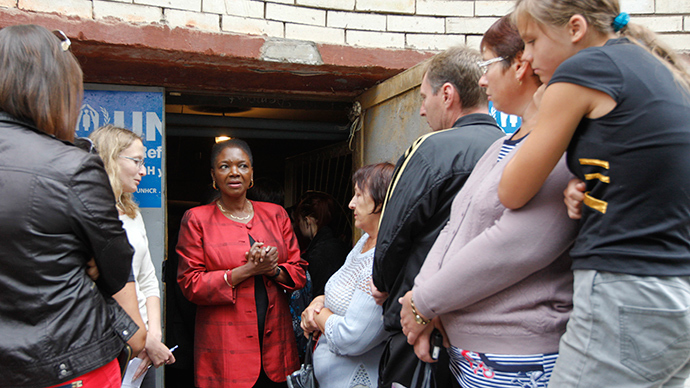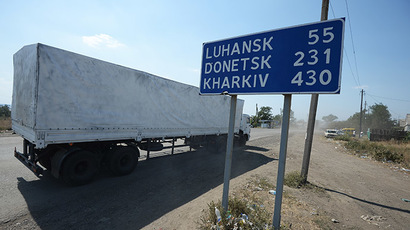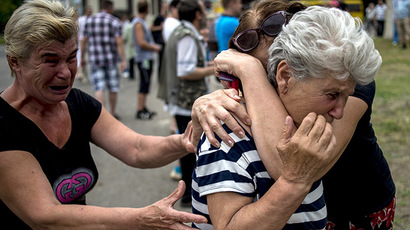‘I regret Russian aid convoy issue became highly-politicized’ – UN humanitarian chief
The UN recognizes the dire situation in east Ukraine, and underlines the importance of avoiding politicizing humanitarian issues, as happened with the Russian aid convoy, UN humanitarian chief Valerie Amos told RT.
The situation in east Ukraine, where fighting between the Kiev
troops and militia continues, is deteriorating, Valerie Amos, the
UN Under-Secretary-General for Humanitarian Affairs and Emergency
Relief Coordinator said in an interview with RT Saturday.
“We are very concerned that the situation is getting worse
because the fighting has not stopped. In the east, where the
fighting continues, we still have a lot of people in need of
humanitarian aid,” she said.
Baroness Amos is on a trip to Ukraine and has visited several
eastern regions, including Slavyansk (Sloviansk in Ukrainian
language). The city used to be a militia stronghold until
government forces regained control over the area in July
following fierce fighting.

“Today, I was able to meet and talk to people in Slavyansk
who have fled the fighting, who basically wanted to go home. That
is all they wanted. They wanted peace, stability and security and
were worried for those they have left behind,” she said.
The UN official’s visit comes a day after Russia came under fire
from the West for sending an aid convoy without Kiev's final
approval to Lugansk region.
Lugansk and neighboring areas have been repeatedly shelled
lately, which resulted in casualties among civilians. Because of
damaged infrastructure in Lugansk, there is no water and
electricity supply, and phone and internet lines are also down.
Our team in #Lugansk says shelling of residential areas continues, endangers the lives of civilians #Ukrainehttp://t.co/SjPXKMjIrv
— ICRC (@ICRC) August 23, 2014
According to the Red Cross, there is an “urgent need for
essentials like food and medical supplies” in Lugansk.
When asked why Western countries approved sending aid to Syria
without agreeing it with the Syrian government, Baroness Amos
said there was a big difference.
“What we have is a Security Council resolution that
authorizes–through four additional
border-crossing points that are not controlled on the Syrian
side, by the Syrian government – the United Nations to deliver
humanitarian supplies across the border,” she said. “And
there is a monitoring mechanism that has been established to
confirm that the supplies are of a humanitarian nature. So, it’s
very very different. It’s the UN as an independent body
delivering humanitarian supplies which are monitored before they
cross the border with the authority of the UN Security
Council.”
On Thursday, Russia proposed that the UN Security Council issue a
decision to support the delivery of the humanitarian aid to
Ukraine. However, Moscow’s initiative was blocked by the United States and Lithuania.
“In particular, they proposed to remove from the text calls
for a cease-fire and for ensuring the safe delivery of
humanitarian aid, as well as the reference to the fact that the
humanitarian aid is being sent by the Russian side,” the
Russian Ministry said in a statement.
Before entering Ukraine, Russian trucks carrying aid spent a week
stuck at the Ukrainian border. The cargo was recognized as
humanitarian aid by the ICRC, which inspected the vehicles and
was to accompany the convoy but later dropped the plan over
security concerns. After days of talks, Kiev also recognized the
convoy as humanitarian. But when everything was agreed upon, the
Ukrainian side found yet another pretext to postpone giving the
aid convoy a green light.

“We all agree that there is a humanitarian crisis and we
should do everything that we can to get aid to those
people,” Amos told RT, adding that they want that aid to be
delivered “as quickly as possible.”
Meanwhile, the UN official said that in case with Syria “it
took the Security Council three years to agree on a resolution
that enabled cross-border operations for the UN across
border-crossings that were not controlled by the Syrian
government”.
According to Amos, “only 34” out of 227 Russian trucks
were checked and “the agreement with the ICRC was not adhered
to, which is why they did not in the end participate,” she
said.
The #Russian#AidConvoy is moving into #Ukraine, but we are not escorting it due to the volatile security situation.
— ICRC (@ICRC) August 22, 2014
Now all the trucks are back in Russia. RT asked the UN official’s
opinion on whether it will help to ease the tensions surrounding
the aid convoy.
“I think that there are political issues which need to be
addressed between Ukraine and the Russian Federation. What I
think is important in terms of the humanitarian aspects of this,
is that those aspects are not politicized. One of the important
things about humanitarian work is that it’s independent, it’s
neutral, it’s about bringing aid to people in desperate need. I
regret that this whole issue of the convoy became
highly-politicized. And I hope that this does not happen
again,” Baroness Amos said.
We live without any certainty-we go 2 bed not knowing what will happen tomorrow: women #IDPs @ Krasnyi Lyman #Ukrainepic.twitter.com/YHQODhFUiP
— Valerie Amos (@ValerieAmos) August 23, 2014
According to the humanitarian chief, the key thing that “everybody wants” is for the fighting to stop.














